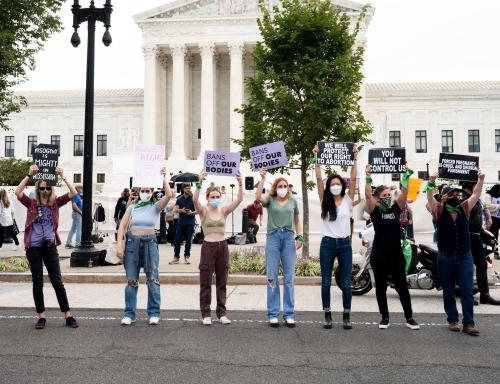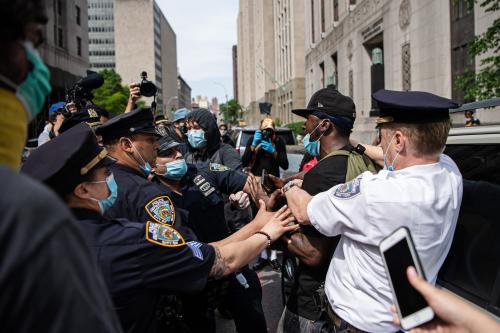Russell Wheeler and Stuart Taylor join Walter E. Dellinger III of O’Melveny & Meyers, Ken Feinberg of The Feinberg Group, Theodore H. Frank of AEI Legal Center for the Public Interest, Mark Geistfeld of New York University School of Law, Gillian Hadfield of the University of Southern California, Lord Leonard Hoffmann of the Appellate Committee of the House of Lords, Philip Howard of Common Good, Robert Joffe of Cravath, Swaine & Moore LLP, Judge Edith H. Jones of the United States Court of Appeals for the Fifth Circuit, Alan Morrison of Fair Elections Legal Network, David Schoenbrod of New York Law School, Peter H. Schuck of Yale University, and Michael Traynor of the American Law Institute to discuss the role of the courts in making social policy.
Opening Statement
Gillian Hadfield, moderator: Welcome to this online forum discussing the role of the courts in making social policy. Over the next three days, we will address such questions as: Is it possible for judges to apply the law in court cases without making or affecting social policy? What is “judicial activism”? To what extent should courts and judges take into account the broader societal effects of the cases they rule on? How have case law judgments affected social policy? Where do we draw the line between decisions that courts should make and those that they should not?
We are all coming to this discussion with different perspectives and opinions, and I look forward to exploring these issues in this discussion. Personally, I have been thinking and writing about these issues lately in two very different perspectives. One is in the context of an active debate among academic lawyers and economists about the relative merits of common law and civil code legal regimes in fostering growth in transition and development economies. Common law is frequently seen as adaptive and flexible, able to respond to changing times and needs while civil code regimes are seen as more rigid and ‘top down.’ But flexibility clearly poses the ‘activism’ question of whether judges are the appropriate adapters of law to changing times. The other perspective I have worked with recently is in relation to the increasing pressure to divert matters out of court with alternative dispute resolution and settlements; I’ve wondered whether this idealized reduced role for courts also means a reduced role for citizen participation in generating the legal standards by which we live, standards that are in large part developed through the concrete ‘activist’ process of adjudicating actual ‘cases and controversies’ and not just legislating.
Let me ask Philip Howard to weigh in to get us started with his views.
Philip Howard: What is the role of the courts in making social policy? It has been a tenet of conservatism that judges should not be “activist.” Nominees for the Supreme Court dutifully make statements that the role of judges is only to “apply the law”, not to make law. This indictment of “judicial activism” has its roots in courts that decided to take over the school system, as in Kansas City, or manage “consent decrees for decades”, as with special education in New York City (chronicled in sharp detail by Ross Sandler and David Schoenbrod in Democracy by Decree).
But perhaps this indictment of activism is too simplistic. Doesn’t it depend on the context? Someone sues the dry cleaners for $54 million for losing a pair of pants–the claim should be dismissed, or bounced to small claims court. Otherwise justice is used for extortion. Someone sues for an accident in the playground–arguing that seesaws are unreasonably dangerous. Just the availability of the claim results in the removal of seesaws around the country. Should a plaintiff have this unilateral power? Or should a judge defend social norms of reasonable risk as a matter of law?
Recent decisions by the Supreme Court and other courts illustrate how over-simplistic the rhetoric of “judicial activism” is. The Supreme Court reduces punitive damages awards in the Exxon case, citing the need for predictability, overturns gun control laws on the basis of the undeniably vague Second Amendment, and gives military detainees habeas corpus rights. The Supreme Court of California says there is a right to gay marriage, and the Supreme Court of Rhode Island says there is no right to sue manufacturers of lead paint.
Perhaps courts inevitably make social policy–that this is inherent in the power they yield. If this is so, then what are the principles by which we sort out how they should exercise this power?
Russell Wheeler: Making policy (and not just social policy) I think is inherent in the nature of the work that common law courts do, but how they do so, and how much they do so, varies with type of court (e.g., the general jurisdiction state trial level court versus most supreme courts) and the type of case (applying fairly settled principles of law—most cases—versus trying to apply a vaguely worded statute) and type of disposition (overseeing a settlement versus deciding one of the blockbuster cases that the US Supreme Court announced last week). We could spend many days sorting out these differences.



Commentary
What is the Role of Courts in Making Social Policy?
July 8, 2008